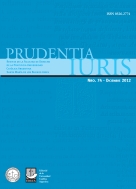Por favor, use este identificador para citar o enlazar este ítem:
https://repositorio.uca.edu.ar/handle/123456789/2654| Título: | El estatuto del ser humano en estado embrionario en el proyecto del Código Civil | Autor: | Herrera, Daniel Alejandro | Palabras clave: | PROYECTOS DE LEY; CODIGO CIVIL; PERSONA HUMANA; ESTATUTOS; EMBRION HUMANO | Fecha de publicación: | 2012 | Editorial: | Universidad Católica Argentina. Facultad de Derecho EDUCA |
Cita: | Herrera, D. A. El estatuto del ser humano en estado embrionario en el proyecto del Código Civil [en línea], Prudentia Iuris. 2012, 74. Disponible en: https://repositorio.uca.edu.ar/handle/123456789/2654 | Resumen: | Resumen: El artículo aborda el tema del estatus jurídico del ser humano en estado embrionario en el proyecto de nuevo Código Civil y Comercial presentado en 2012. Se parte de la cuestión de que el orden jurídico no crea la personalidad, sino que la reconoce en el ser humano por el solo hecho de serlo y se analiza el Código Civil de Vélez Sársfield en sus diversas interpretaciones. Se concluye que a la luz de la Constitución Nacional y el resto del derecho positivo vigente el ser humano en estado embrionario o fetal, desde el momento mismo de su concepción, goza de todos los derechos reconocidos y garantizados por el orden jurídico. En ese marco, se analiza el Artículo 19 del proyecto y se observa que realiza una arbitraria e injusta discriminación al establecer dos momentos para el comienzo de la existencia de la persona. Además, la redacción deja en una indefinición jurídica al ser humano fecundado y concebido extrauterinamente antes de su implantación. También se analiza el tema en relación con la propuesta de articulado referido al cuerpo humano (Art. 17). Se considera el peligro de cosificación y atentado contra la dignidad humana que encierra la propuesta. Abstract: The article approaches the concept of the juridical status of the human being in embryonal state in the new draft of the Civil and Commercial Code entered in vigor in 2012. It considers the issue that the judicial order does not create legal capacity, but rather it recognizes it in humans for the sole fact of being and in the Velez Sarsfield Civil Code it is analyzed in its diverse interpretations. It concludes that within the frame of the National Constitution and of the effective positive Law the human being in its embryo or fetal state, from the very moment of its conception, enjoys all the rights guaranteed by Law. Through this conception, the Article 19 of the project it is analyzed and it is concluded that it establishes an unjust discrimination as distinguishing two different moments for the beginning of the person’s existence. Also, the draft leaves out human beings conceived and fecundated outside the uterus by artificial methods before its implantation. The theme is also analyzed in relation to the new draft of (Art. 17). The proposal to treat a human being as a “thing” is considered an attack to human dignity. |
URI: | https://repositorio.uca.edu.ar/handle/123456789/2654 | ISSN: | 0326-2774 | Disciplina: | DERECHO | Derechos: | Acceso Abierto | Fuente: | Prudentia Iuris, 74 ISSN 0326-2774 |
| Aparece en las colecciones: | PI - 2012 nro. 74 |
Ficheros en este ítem:
| Fichero | Descripción | Tamaño | Formato | |
|---|---|---|---|---|
| estatuto-ser-humano-estado-embrionario.pdf | 214,92 kB | Adobe PDF |  Visualizar/Abrir |
Visualizaciones de página(s)
303
comprobado en 30-abr-2024
Descarga(s)
278
comprobado en 30-abr-2024
Google ScholarTM
Ver en Google Scholar
Este ítem está sujeto a una Licencia Creative Commons

